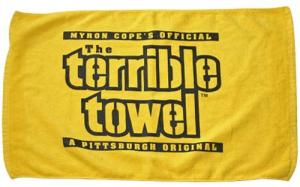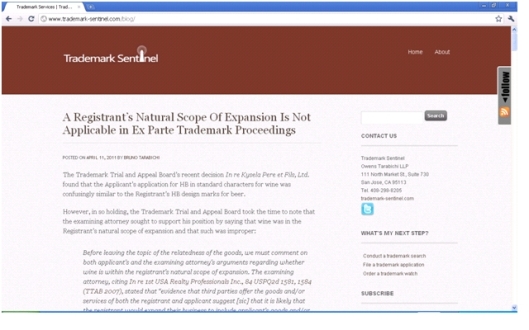It’s football season once again in Pittsburgh, and on the heels of a much-too-close victory in Indianapolis, I will kick off Steelers blogging season at PTL. My off-season wasn’t nearly as colorful as the Steelers’ (I didn’t even get an invite to be on Dancing With the Stars, let alone win it— though, in hindsight, it may have had something to do with my lack of star-status and/or dancing skills).
I recently had a great conversation about the trademark rights in the Terrible Towel at breakfast with my former professor, Michael Madison. He has some excellent analysis over at Madisonian about the possible naked licensing issues involving the Towel.

I’ve blogged on the the Towel in the past, but here’s the quick background for those unfamiliar with the Towel’s origins.
Myron Cope, a Pittsburgh sports announcer known as the “voice of the Pittsburgh Steelers” for many years, is credited with inventing the Terrible Towel. Cope assigned the Terrible Towel trademark to the Allegheny Valley School (AVS), a Pittsburgh-area institution specializing in intellectual developmental disabilities that has cared for Cope’s son, Danny, who has severe autism. Proceeds of the Terrible Towel’s sales benefit the School.
I suspect that a lot of non-Pittsburghers reading this post might not have known that back story, but that virtually everyone reading this post associates that Towel with the Steelers.
And that is precisely the problem here, from a trademark doctrine standpoint.
When consumers associate the mark with the licensee (the Steelers) and not the licensor/owner (AVS), it creates a risk of “naked licensing” and a possible forfeiture of the owner’s rights in the mark. For a nice general overview of naked licensing in the context of a recent Ninth Circuit decision, check out Jim Singer’s post from last winter.
It’s tempting to simply say “OK, so consumers think the Towel comes from the Steelers and not the AVS– so what?”. From a practical standpoint, it’s probably not a big deal. People buy the towels (we’ve got one at my house), they wave them at games, and the school gets money. Everyone wins.
But this scenario does raise an interesting question about the internal architecture of trademark law– why the statutory language says what it says and what the purpose(s) of trademark law is/are (e.g., protecting investments in marketing, preventing consumer confusion, etc.)
I agree with Professor Madison that one of the fundamental purposes of trademark law is consumer protection. A quick look at some of the language in two historic trademark decisions provides some support for this position.
From Dawn Donut Company, Inc. v. Hart’s Food Stores, Inc. (1959):
“If the licensor is not compelled to take some reasonable steps to prevent misuses of his trademark in the hands of others the public will be deprived of its most effective protection against misleading uses of a trademark. The public is hardly in a position to uncover deceptive uses of a trademark before they occur and will be at best slow to detect them after they happen. Thus, unless the licensor exercises supervision and control over the operations of its licensees the risk that the public will be unwittingly deceived will be increased and this is precisely what the Act is in part designed to prevent. See Sen. Report No. 1333, 79th Cong., 2d Sess. (1946). Clearly the only effective way to protect the public where a trademark is used by licensees is to place on the licensor the affirmative duty of policing in a reasonable manner the activities of his licensees.” (Emphasis mine.)
And from Taco Cabana International, Inc. v. Two Pesos, Inc. (1991):
“The purpose of the quality-control requirement is to prevent the public deception that would ensue from variant quality standards under the same mark or dress. Where the particular circumstances of the licensing arrangement persuade us that the public will not be deceived, we need not elevate form over substance and require the same policing rigor appropriate to more formal licensing and franchising transactions.” (Emphasis mine.)
It’s hard to imagine a public outcry when Towel wavers “find out” that the Steelers are not the the “real” source of the Towels. But it is important for trademark owners to exercise care to avoid “naked licensing” when entering into a licensing deal.
Trademark law recognizes the value of providing flexibility for licensees/licensors and relieving them of statutory formalities (where possible), but it must do so while remaining grounded on one of its key commitments — to prevent consumer confusion in the marketplace.
Updated October 5, 2011:
Considering Bernard Schneider’s comment below and having done a bit more digging into the “naked licensing” doctrine, I think I should try to flesh out my thoughts a bit more here.
The license between AVS and the Steelers for the Terrible Towel is not a “naked license.”
There are a couple of reasons for this. First, AVS “does controls the nature and quality of goods sold by the Pittsburgh Steelers under its trademarks. [AVS] periodically examines those goods and has the right under its license agreement to demand quality enhancements if necessary (See first comment below).
Second, there’s the “inurement” doctrine. As Prof. Madison explains in an update to his post:
The Lanham Act provides, in connection with registration, that use of a mark by a “related” company “inures to the benefit” of the mark owner (registrant). […] The public policy behind the “inurement” rule closely parallels the public policy behind the “naked licensing” rule: so long as consumers get a consistent product/service experience associated with the mark, then consumers are not deceived. The mark is valid; actual ownership of the mark is, for this purpose, not relevant.
[…]
If the AVS and the Steelers have a licensing relationship that in fact grants the AVS the power to monitor and control the quality of goods produced under the TT mark, then the consumer goodwill associated with the TT inures to the benefit of the AVS.
I think these two doctrines (quality control and inurement) square with a consumer-protective theory of trademark law. If consumers are confused as to the “real” source (i.e., the record owner of a particular trademark), a close relationship between licensor and licensee and the presence of quality-control mechanisms should obviate any theoretical harm to consumers.
Put differently, these doctrines make sure that consumers get what they think they’re getting.
It’s interesting to try to unpack the statutory language of the Lanham Act and try to puzzle out trademark law’s key functions in society. And I think there’s good evidence to suggest that consumer protection is a big part of it.
But it’s also important for brand owners to have a clear set of rules that allow them to enter into licensing relationships freely in order to capitalize their brands (and, in the case of the Terrible Towel– for an incredibly good purpose).
And as the Steelers wrestle with injury problems as they prepare for this week’s home game against Tennessee, one thing’s for sure. Come Sunday afternoon, Heinz Field will look a little something like this:






